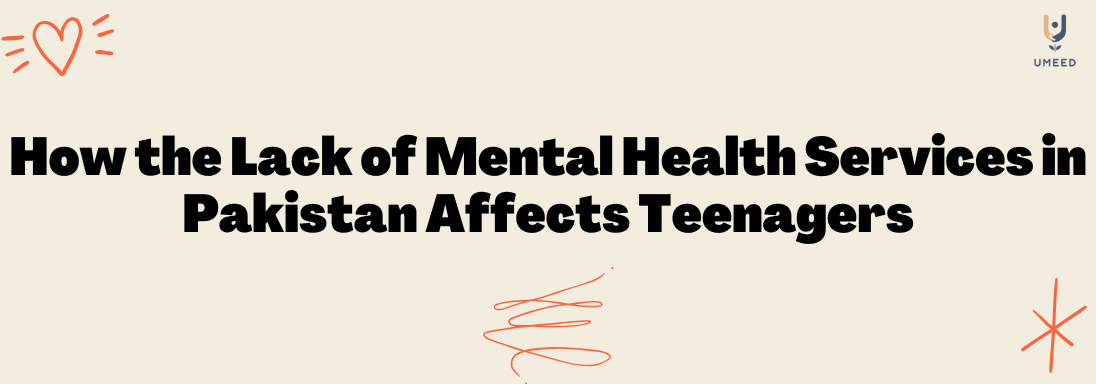
How the Lack of Mental Health Services in Pakistan Affects Teenagers
- April 29, 2025
- 0 Likes
- 1606 Views
- 0 Comments
Mental health is just as important as physical health, especially for teenagers. In Pakistan, many young people face emotional and psychological struggles, but there are few places where they can get help. How the lack of mental health services in Pakistan affects teenagers is a serious issue that needs more attention. Without proper support, teenagers are left to suffer in silence, which can lead to long-term problems.
This article explains how the lack of mental health services in Pakistan affects teenagers and what it means for the country’s future. It also looks at the current situation, the challenges, and what can be done to help. If you are concerned about teen mental health in Pakistan, this article will give you valuable insight.
The Current State of Mental Health Services in Pakistan
Pakistan has a population of over 240 million people, but mental health care is not widely available. According to Pakistan mental health statistics, there are fewer than 500 trained psychiatrists in the entire country. Most of them are based in big cities like Karachi, Lahore, and Islamabad. That means rural areas have little or no access to professional help.
This uneven access is part of the wider lack of health facilities in Pakistan. There are not enough hospitals, clinics, or trained staff to deal with mental health issues. Teenagers who live in villages or small towns are often left with no choice but to ignore their mental health problems. This makes it clear how the lack of mental health services in Pakistan affects teenagers in a very real way.
Common Mental Health Issues Among Teenagers in Pakistan
Teenagers in Pakistan face many mental health challenges. These include anxiety, depression, stress from exams, family problems, and peer pressure. Many also deal with trauma from domestic violence, bullying, or poverty. Without proper care, these issues can become worse over time.
Because of the lack of mental health services in Pakistan, many teens don’t even realize they are struggling with a medical condition. They may be told to “stay strong” or that their problems are “just a phase.” But untreated mental health issues can lead to school dropouts, substance abuse, or even suicide. This highlights again how the lack of mental health services in Pakistan affects teenagers deeply.
Barriers to Accessing Mental Health Support
There are several reasons why teenagers in Pakistan cannot access proper mental health care. First, there is a strong social stigma. Many people think talking about mental health is shameful or a sign of weakness. This makes it hard for teenagers to speak up and ask for help.
Second, the cost of private treatment is too high for most families. There are few free mental health services in Pakistan, and those that do exist are either overcrowded or hard to reach. This economic barrier shows how the lack of mental health services in Pakistan affects teenagers, especially those from poor backgrounds.
The Role of Government and Policy
The government has started to take steps to improve the situation. The Pakistan mental health policy aims to make mental health care part of the public health system. But progress is slow, and many goals are still not met. More funding, training, and awareness are needed to make a real difference.
Even with this policy in place, the mental health services in Pakistan remain underdeveloped. Many schools do not have counselors, and there is little training for teachers to spot warning signs. This situation makes it clear how the lack of mental health services in Pakistan affects teenagers not just medically, but socially and educationally as well.
Social Media and Its Impact
Today’s teenagers spend a lot of time on social media. While it can offer connection and support, it can also increase stress, anxiety, and feelings of low self-worth. In Pakistan, many teens are affected by online bullying or unrealistic beauty and lifestyle standards.
Without proper mental health education or access to therapists, these problems are often ignored. Teens may try to cope alone, which can lead to harmful behaviors. This is another way how the lack of mental health services in Pakistan affects teenagers in modern times.
The Need for School-Based Mental Health Programs
Schools can play a major role in early detection and support. Programs that teach emotional skills, offer counseling, and reduce stigma are proven to help teens feel better. In some countries, these are standard practices, but in Pakistan, such programs are rare.
There is a strong need to introduce these programs in both public and private schools. Not only would this provide support, but it would also spread awareness and reduce fear around mental health topics. This step can directly address how the lack of mental health services in Pakistan affects teenagers and help change the future.
What Can Be Done?
To solve this crisis, Pakistan must invest in better mental health services in Pakistan. That means training more professionals, building mental health centers, and creating support systems in schools and communities. Public awareness campaigns can also help change the way people think about mental illness.
International partnerships and NGOs can also help provide free mental health services in Pakistan, especially in rural areas. When more people understand and support mental health care, teenagers will feel less alone. Only then can we truly fix how the lack of mental health services in Pakistan affects teenagers.
Final Thoughts
In conclusion, how the lack of mental health services in Pakistan affects teenagers is a growing problem that needs immediate attention. From emotional struggles to school performance and even suicide, the impact is serious. The lack of trained staff, funding, and awareness makes things worse for teens who already face many challenges.
The government, schools, communities, and families all have a role to play. With the right actions, we can improve mental health Pakistan and ensure a better future for the country’s youth. Ignoring this issue will only increase the suffering. It’s time to take it seriously and offer real help where it’s needed most.
Get Help Today – You Are Not Alone
If you or someone you know is struggling with mental health issues, don’t wait. Support is available. Umeed offers online mental health services in Pakistan, making it easier for teenagers and families to get the help they need from the comfort of their homes.
Whether you need therapy, counseling, or just someone to talk to, Umeed provides professional, confidential care from licensed experts. In a country where free mental health services in Pakistan are hard to find, Umeed is working to close that gap and bring healing to those who need it most.
Visit Umeed’s website to learn more or book a session.
Call: 0343 6004992
Email: [email protected]
